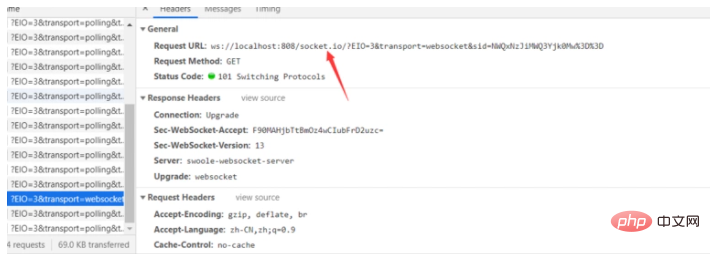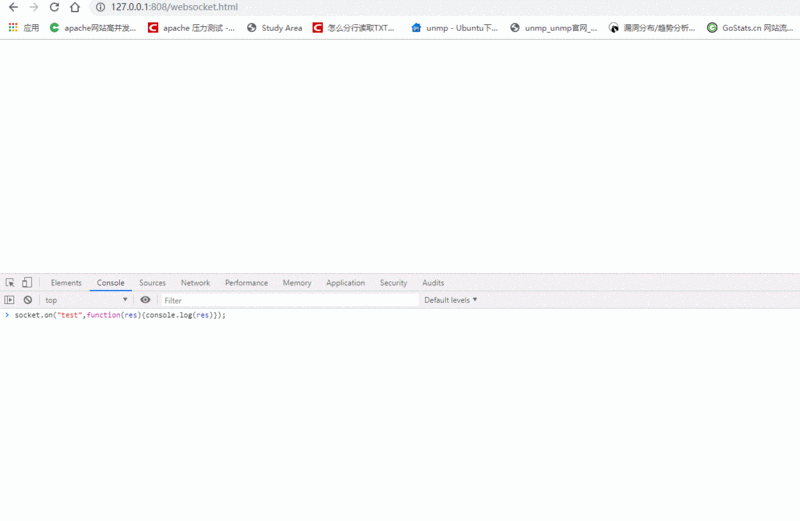ホームページ >PHPフレームワーク >ThinkPHP >thinkphp 6.0 swoole は WebSocket の使用を拡張します
thinkphp 6.0 swoole は WebSocket の使用を拡張します
- 藏色散人転載
- 2020-12-15 09:35:533121ブラウズ
以下は、thinkphp Framework のチュートリアル欄で、thinkphp 6.0 swoole 拡張 Websocket の使い方チュートリアル (think-swoole) を紹介します。必要としている!
thinkphp 6.0 swoole 拡張 Websocket 使用法チュートリアル (think-swoole)
まえがき
TP-SWOOLE の最新バージョンは大きく変更されており、この記事で提供されている方法はは使用できなくなりました。https://github.com/xavieryang007/think-swoole-demo/blob/master/doc/document/4.1-websocket.md を参照してください。
'server' => [
'host' => '0.0.0.0', // 监听地址
'port' => 808, // 监听端口
'mode' => SWOOLE_PROCESS, // 运行模式 默认为SWOOLE_PROCESS
'sock_type' => SWOOLE_SOCK_TCP, // sock type 默认为SWOOLE_SOCK_TCP
'options' => [
'pid_file' => runtime_path() . 'swoole.pid',
'log_file' => runtime_path() . 'swoole.log',
'daemonize' => false,
// Normally this value should be 1~4 times larger according to your cpu cores.
'reactor_num' => swoole_cpu_num(),
'worker_num' => swoole_cpu_num(),
'task_worker_num' => 4,//swoole_cpu_num(),
'enable_static_handler' => true,
'document_root' => root_path('public'),
'package_max_length' => 20 * 1024 * 1024,
'buffer_output_size' => 10 * 1024 * 1024,
'socket_buffer_size' => 128 * 1024 * 1024,
'max_request' => 3000,
'send_yield' => true,
],
],
'websocket' => [
'enabled' => true,// 开启websocket
'handler' => Handler::class, //自定义wbesocket绑定类
'parser' => Parser::class, //自定义解析类
'route_file' => base_path() . 'websocket.php',
'ping_interval' => 25000,
'ping_timeout' => 60000,
'room' => [
'type' => TableRoom::class,
'room_rows' => 4096,
'room_size' => 2048,
'client_rows' => 8192,
'client_size' => 2048,
],
],
'auto_reload' => true,
'enable_coroutine' => true,
'resetters' => [],
'tables' => [],
ハンドラーとパーサーはカスタム WebSocket を大幅に容易にしますデフォルトのシステムには、socketio が統合されています。 この記事では、socketio の使い方を中心に紹介しますので、皆さんが soketio について一定の理解と使い方の基礎を持っていることを前提としています。 socketIo は、デフォルトでリクエスト アドレスの後に対応するパラメータを追加します。
同時に、socketio は http://url/socket.io を次のように認識します。デフォルトの / は、WebSocket サービスをサポートするアドレスです。 
アドレス要求は tp-swoole3.0
<?php namespace think\swoole\websocket\socketio;
use think\Config;
use think\Cookie;
use think\Request;
class Controller
{
protected $transports = ['polling', 'websocket'];
public function upgrade(Request $request, Config $config, Cookie $cookie)
{
if (!in_array($request->param('transport'), $this->transports)) {
return json(
[
'code' => 0,
'message' => 'Transport unknown',
],
400
);
}
if ($request->has('sid')) {
$response = response('1:6');
} else {
$sid = base64_encode(uniqid());
$payload = json_encode(
[
'sid' => $sid,
'upgrades' => ['websocket'],
'pingInterval' => $config->get('swoole.websocket.ping_interval'),
'pingTimeout' => $config->get('swoole.websocket.ping_timeout'),
]
);
$cookie->set('io', $sid);
$response = response('97:0' . $payload . '2:40');
}
return $response->contentType('text/plain');
}
public function reject(Request $request)
{
return json(
[
'code' => 3,
'message' => 'Bad request',
],
400
);
}
}TP6.0 で内部処理され、プラグインの登録はサービス モードで実行されます。登録するには、tp-swoole サービス登録ファイル内のルート登録情報を表示できます。リンク ルールをカスタマイズする場合は、ルートを上書きできます。
<?php // +----------------------------------------------------------------------
// | ThinkPHP [ WE CAN DO IT JUST THINK IT ]
// +----------------------------------------------------------------------
// | Copyright (c) 2006-2018 http://thinkphp.cn All rights reserved.
// +----------------------------------------------------------------------
// | Licensed ( http://www.apache.org/licenses/LICENSE-2.0 )
// +----------------------------------------------------------------------
// | Author: yunwuxin <448901948@qq.com>
// +----------------------------------------------------------------------
namespace think\swoole;
use Swoole\Http\Server as HttpServer;
use Swoole\Websocket\Server as WebsocketServer;
use think\App;
use think\Route;
use think\swoole\command\Server as ServerCommand;
use think\swoole\facade\Server;
use think\swoole\websocket\socketio\Controller;
use think\swoole\websocket\socketio\Middleware;
class Service extends \think\Service
{
protected $isWebsocket = false;
/**
* @var HttpServer | WebsocketServer
*/
protected static $server;
public function register()
{
$this->isWebsocket = $this->app->config->get('swoole.websocket.enabled', false);
$this->app->bind(Server::class, function () {
if (is_null(static::$server)) {
$this->createSwooleServer();
}
return static::$server;
});
$this->app->bind('swoole.server', Server::class);
$this->app->bind(Swoole::class, function (App $app) {
return new Swoole($app);
});
$this->app->bind('swoole', Swoole::class);
}
public function boot(Route $route)
{
$this->commands(ServerCommand::class);
if ($this->isWebsocket) {
$route->group(function () use ($route) {
$route->get('socket.io/', '@upgrade');
$route->post('socket.io/', '@reject');
})->prefix(Controller::class)->middleware(Middleware::class);
}
}
/**
* Create swoole server.
*/
protected function createSwooleServer()
{
$server = $this->isWebsocket ? WebsocketServer::class : HttpServer::class;
$config = $this->app->config;
$host = $config->get('swoole.server.host');
$port = $config->get('swoole.server.port');
$socketType = $config->get('swoole.server.socket_type', SWOOLE_SOCK_TCP);
$mode = $config->get('swoole.server.mode', SWOOLE_PROCESS);
static::$server = new $server($host, $port, $mode, $socketType);
$options = $config->get('swoole.server.options');
static::$server->set($options);
}
}Socketio はデフォルトでデモを使用します
nbsp;html>
<meta>
<title>Title</title>
<script></script>
<script>
const socket = io('http://localhost:808');
socket.emit("test", "your message");
socket.on("test",function(res){console.log(res)});
</script>
Websocket ルーティング設定方法アプリ ディレクトリに新しい websocket.php ファイルを作成します。リフレクションを使用しているため、クロージャパラメータ 名前を任意に定義することはできません。それ以外の場合は、名前を注入できません。最初のパラメータは websocket (現在の Websocket の Server オブジェクト) で、2 番目のパラメータ data はクライアントによって送信されたデータです。 Socketio Emit の最初のパラメータは、イベント名として使用される Websocket::on の最初のパラメータと同じです。 <?php /**
* Author:Xavier Yang
* Date:2019/6/5
* Email:499873958@qq.com
*/
use \think\swoole\facade\Websocket;
Websocket::on("test", function (\think\swoole\Websocket $websocket, $data) {
//var_dump($class);
$websocket->emit("test", "asd");
});
Websocket::on("test1", function ($websocket, $data) {
$websocket->emit("test", "asd");
});
Websocket::on("join", function (\think\swoole\Websocket $websocket, $data) {
$websocket->join("1");
});
新しい WebSocket サービスを使用するには、上記の方法を参照してください。もちろん、tp-swoole3.0 には他にも多くの新機能があるので、試してみる必要があります。  次の記事では私の使用プロセスも紹介します。
次の記事では私の使用プロセスも紹介します。
以上がthinkphp 6.0 swoole は WebSocket の使用を拡張しますの詳細内容です。詳細については、PHP 中国語 Web サイトの他の関連記事を参照してください。
声明:
この記事はsegmentfault.comで複製されています。侵害がある場合は、admin@php.cn までご連絡ください。

